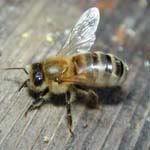Or no bees at all:
MERCED, Calif. – The mysterious 4-year-old crisis of disappearing honeybees is deepening. A quick federal survey indicates a heavy bee die-off this winter, while a new study shows honeybees' pollen and hives laden with pesticides.
Two federal agencies along with regulators in California and Canada are scrambling to figure out what is behind this relatively recent threat, ordering new research on pesticides used in fields and orchards. Federal courts are even weighing in this month, ruling that the U.S. Environmental Protection Agency overlooked a requirement when allowing a pesticide on the market.
[snip]
Bees have been declining over decades from various causes. But in 2006 a new concern, "colony collapse disorder," was blamed for large, inexplicable die-offs. The disorder, which causes adult bees to abandon their hives and fly off to die, is likely a combination of many causes, including parasites, viruses, bacteria, poor nutrition and pesticides, experts say.
"It's just gotten so much worse in the past four years," said Jeff Pettis, research leader of the Department of Agriculture's Bee Research Laboratory in Beltsville, Md. "We're just not keeping bees alive that long."
This year bees seem to be in bigger trouble than normal after a bad winter, according to an informal survey of commercial bee brokers cited in an internal USDA document. One-third of those surveyed had trouble finding enough hives to pollinate California's blossoming nut trees, which grow the bulk of the world's almonds. A more formal survey will be done in April.
"There were a lot of beekeepers scrambling to fill their orders and that implies that mortality was high," said Penn State University bee researcher Dennis vanEngelsdorp, who worked on the USDA snapshot survey.
Beekeeper Zac Browning shipped his hives from Idaho to California to pollinate the blossoming almond groves. He got a shock when he checked on them, finding hundreds of the hives empty, abandoned by the worker bees.
The losses were extreme, three times higher than the previous year.

No comments:
Post a Comment